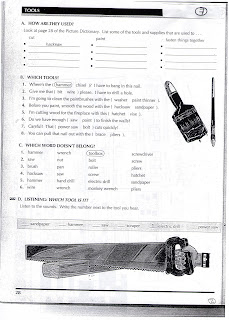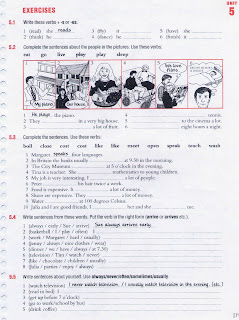will-future – Statements –
Exercise
will-future – Statements –
Exercise
Task No.
4211
Put
in the verbs in brackets into the gaps and form sentences. Use will-future.
Do you need
help?
Negations in the will-future – Exercise
Task No. 4213
https://web.archive.org/web/20210128030257/https://www.englisch-hilfen.de/en/exercises/tenses/will_future_negation.htm
Put in the verbs in
brackets into the gaps and form negative sentences in will-future.
Do you need help?
Questions in the will-future – Exercise 1
Task No. 1377
https://web.archive.org/web/20201109215804/https://www.englisch-hilfen.de/en/exercises/questions/will_future.htm
Put in the verbs in
brackets into the gaps. Use the will-future.
Mind the word order in questions.
Do you need help?
Sentences and questions in the will-future
– Exercise 1
Task No. 4215
https://web.archive.org/web/20210120063211/https://www.englisch-hilfen.de/en/exercises/tenses/will_future_mix.htm
Put in the verbs in
brackets into the gaps. Use will-future.
Watch the punctuation and form sentences or questions.
Do you need help?
Task No.
4211
Put
in the verbs in brackets into the gaps and form sentences. Use will-future.
Do you need
help?
Negations in the will-future – Exercise
Task No. 4213
https://web.archive.org/web/20210128030257/https://www.englisch-hilfen.de/en/exercises/tenses/will_future_negation.htm
Put in the verbs in
brackets into the gaps and form negative sentences in will-future.
Do you need help?
Questions in the will-future – Exercise 1
Task No. 1377
https://web.archive.org/web/20201109215804/https://www.englisch-hilfen.de/en/exercises/questions/will_future.htm
Put in the verbs in
brackets into the gaps. Use the will-future.
Mind the word order in questions.
Do you need help?
Sentences and questions in the will-future
– Exercise 1
Task No. 4215
https://web.archive.org/web/20210120063211/https://www.englisch-hilfen.de/en/exercises/tenses/will_future_mix.htm
Put in the verbs in
brackets into the gaps. Use will-future.
Watch the punctuation and form sentences or questions.
Do you need help?
TP1/SET1
MIRÁ EL
VOCABULARIO. SON 4 PALABRAS CON SUS DIBUJOS.
COMPLETÁ
LAS ORACIONES .
TRADUCILAS
TRADUCILO CON DICCIONARIO.
RECORDA:
MUST : DEBER / MUSTN´T: NO DEBE / NEVER: NUNCA / ALWAYS:
SIEMPRE
COMPLETA EL CUADRO CON LA INFORMACION QUE TE PIDE. LA INFORMACION ESTA EN
EL CUADRO. NO HACE FALTA TRADUCIR PARA
ENTREGAR.
FORMAS INTERROGATIVAS Y NEGATIVAS -
1 - ESTA ACTIVIDAD, COMO SIEMPRE, SE RESUELVE EN
LA HOJA DE TU CARPETA, DONDE SE LEA EN EL MARGEN IZQUIERDO NOMBRE, APELLIDO Y
DIVISIÓN QUE NO PUEDE ESTAR NI BORRADO NI TACHADO.
2 - SE SACA FOTO (NO CAPTURA DE PANTALLA, NO WORD, NO PDF) Y SE
SUBE AL CLASSROOM.
4 - SI NO PODES ENTREGAR VIA CLASSROOM AVISAR QUE
LA ENTREGA SERÁ POR MAIL.
PREFERENTEMENTE ENVIAR POR CLASSROOM.
MIRAR LAS ORACIONES SIGUIENTES
(14) Y:
a - Pasar a interrogativo,
negativo.
b -Traducir las oraciones
afirmativas.
c - Subrayar el verbo principal
de cada oración.
d - Marcar con rojo el SUJETO y con verde el PREDICADO
de cada oración que doy en la ACTIVIDD 1.
ACTIVIDAD
1
1 - Pull the lever towards and the forklift truck move backwards.
2 - The plane has two wings and
three doors.
3 - The electric current will flow around the circuit from the
power source to the lamp.
4 - That material is completely
corrosion-resistant.
5 - It will bend if you put a heavy weight on it.
7- Open the bonnet of the
car.
9 - Two powerful jet engines will
propel the aeroplane forwards at high speed.
11 -The air is leaving the engine through the valve.
Cómo trabajar con esta actividad:
1- Leé la teoría hasta el final
2- Cuando terminás de leer la teoría hacé los ejercicios que aparecen en estos links
THERE IS - THERE ARE -
THERE WILL BE
1. Las expresiones there is y there are hablan de la existencia o no-existencia de
las cosas, como en español hay.
► there is significa HAY:
THERE IS A NOTEBOOK IN THE ROOM (HAY).
Hay una
notebook en la habitación.
►
there are significa HAY y lo usamos
cuando HAY más de una cosa.
THERE ARE TWO NOTEBOOKS IN THE ROOM.
Hay dos
notebooks en la habitación.
Usos de there is, there are en oraciones afirmativas y preguntas.
|
|
Singular |
Plural |
|
Affirmative sentences |
There is a cat in the room. |
There are two
cats in the room. |
|
Negative sentences |
There is not a cat in the room |
There are not two cats in the room. |
|
There is no cat in the room. |
There are no cats in the room. |
|
|
Questions |
Is there a cat in the room? |
Are there two cats in the room? |
|
|
Singular |
Plural |
|
Affirmative sentences |
There's a cat in the room. |
There are two cats in the room. |
|
Negative sentences |
There's not a cat in the room. |
There are two cats in the room. |
|
There isn't a cat in the room. |
||
|
There's no cat in the room. |
There aren't cats in the room. |
|
|
Questions |
Is there a cat in the room? |
Are there two cats in the room? |
. Las expresiones there is y there are en FUTURO se
arman así:
There will be (habrá)
y lo usamos para singular y plural
►There will be a football match in one week
Habrá un partido de fútbol en una
semana)
Habrá montones de actividades de tarea
y negativo:
►There
will not be lots of activities for homework.
No habrá montones de
actividades de tarea.
https://www.englisch-hilfen.de/en/exercises/various/there_is_there_are2.htm
https://www.englisch-hilfen.de/en/exercises/various/there_is_there_are3.htm
TP5 (también está en el classroom)
Fecha de entrega 12/08. También está en classroom.
Cómo trabajar con este texto:
1- Leé la teoría hasta el final
2- Cuando terminás de leer la teoría hacé los ejercicios que aparecen en estos links
3- Revisá si los hiciste bien o repetilos hasta que salgan correctos.
4 - ENVIA EL TRABAJO QUE HICISTE. TRANSCRIBI todos los ejercicios que realizaste en una hoja que tenga tu NOMBRE APELLIDO Y DIVISION . LE SACAS FOTO Y LO ENVIAS A MI MAIL O AL CLASSROOM. A MANO. NO WORD, NO TXT.
Podés hacerlos en este mismo documento o en una hoja y enviar la 4foto o en un documento nuevo que solo tenga ejercicios.
1. Usos del FUTURO SIMPLE
1.1. Acciones que sucederán en el futuro sin intención del narrador
The sun will shine tomorrow. El sol brillará mañana
1.2.Predicciones ya conocidas.
(I think)Sue will arrive in Paris at 6 pm.
1.3. Acciones, decisiones espontáneas (que se deciden en el momento, por ejemplo)
Hang on! I'll have a word with you.
(At the supermarket) I'll take some chocolates
2. Palabras indicadoras de Futuro Simple.
No siempre se utilizan pero podrías encontrar:
next week
this summer
tomorrow
3. Form
will + infinitive
4. Examples
4.1. Affirmative sentences in the will-future
|
Long forms |
Contracted forms |
|
I will win the match. |
I'll win the match. (Yo Ganaré el partido) |
|
You will win the match. |
You'll win the match. |
|
He will win the match. |
He'll win the match. |
4.2. Negative sentences in the will-future
La forma corta se forma con 'll not + el verbo base
|
Long forms |
Contracted forms |
|
I will not win the match. |
I'll not win the match. |
|
I won't win the match. |
|
|
You will not win the match.. |
You'll not win the match. |
|
You won't win the match. |
|
|
He will not win the match. |
He'll not win the match. |
|
He won't win the match. |
4.3. Questions in the will-future
|
Long forms |
Contracted forms |
|
Will I win the match? |
not possible |
|
Will you win the match? |
|
|
Will he win the match?
|
TP4 (también está en classroom)
TEORIA:
ACTIVIDAD (MODO IMPERATIVO)
TP3
PRONOMBRES PERSONALES
TP2
(también está en el classroom)
2-The plane is flying at an angle of 45° to the ground.
3-The electric current will flow around the circuit from the power source to the lamp.
4-That material is completely corrosion-resistant.
5-It will bend if you put a heavy weight on it.
6-The road is going across the lake.
7-Open the bonnet of the car and I’ll have a look at the engine.
8-Two powerful jet engines will propel the aeroplane forwards at high speed.
9-Be careful with that wire.
10-The air is leaving the engine through the valve.
1.A hovercraft (move) over land and water.
2.A powerful engine (push) a fan.
3.The fan (take) the air in.
4.Water (fall) onto the blades of the turbine.
5.The security man (allow) enter anyone to the factory.
6.I (press) the brake pedal hard.
7.I (install) the new air conditioner.
8.The mechanic (adjust) the tyre pressures.
PRESENT CONTINUOUS OR PRESENT PROGRESSIVE































